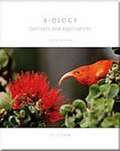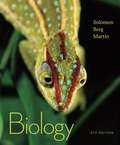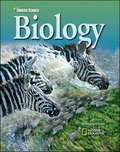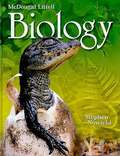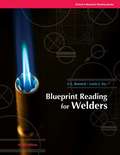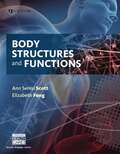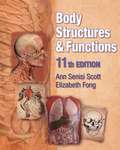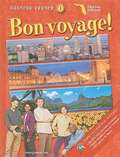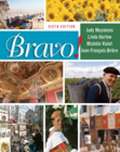- Table View
- List View
More NIMAC books are available at www.nimac.us. If you find your title in the NIMAC and not in Bookshare then please contact us to request it.
Biology: Concepts and Applications
by Cecie Starr Christine A. Evers Lisa StarrBIOLOGY: CONCEPTS AND APPLICATIONS supplies an 800 page, introductory issues-oriented approach with enormous instructional power. Starr supports mastery throughout while encouraging the critical thinking students need as citizens, voters, parents, and consumers. The "Impacts, Issues" and "How Would You Vote?" features new to this edition make biology come alive. An "Impacts, Issues" case study opens each chapter focusing on a biology-related societal issue. Short films that expand on the issue are on the free Student CD. Each chapter's "How Would You Vote?" asks students to consider biology-related news, apply knowledge, cast a vote on the web and see state and nationwide voting tallies. The access codes that accompany all new copies provide online access to 1) BiologyNow, a learning tool that helps students assess their unique study needs through pretests, post-test and personalized learning plans; 2) InfoTrac, a library of full text articles; 3) vMentor, a live tutoring service and 4) "How Do I Prepare," a feature that allows students to review basic math, chemistry, and other skills that will help them more easily master introductory biology. And now with an MP3 download of this title, you don't have to lose prep time during a long commute'any MP3 player lets you or your students listen and review the text at the gym, in the library, at the office ? anywhere! Starr is the most successful author in non-majors biology because of her clear and engaging writing
Biology
by Eldra P. Solomon Linda R. Berg Diana W. MartinStudying biology in today's fast-paced environment where new research is cropping up daily is exciting--and also a bit daunting, unless you have the right textbook to help you make sense of it all. Popular with students at colleges nationwide, Solomon, Berg, and Martin's BIOLOGY is often described as the best text available for learning biology. Filled with resources to guide your study, the Eighth Edition brings clarity to key concepts as it draws you into the excitement of new research in genetics, cell communication, evolution, and many other topics. The book's in-chapter Learning System is like a built-in study guide, focusing your attention on key learning objectives. Many of the text's colorful illustrations are correlated with animated figures online so you can interactively study and reinforce your understanding of complex processes.
Biology
by Alton Biggs Whitney Crispen Hagins William G. Holliday Chris L. Kapicka Linda Lundgren Ann Haley Mackenzie William D. Rogers Marion B. Sewer Dinah Zike National Geographic"Glencoe Biology" helps all students succeed with its organization around major Themes, Big Ideas, and Main Ideas of biology and its strong support for reading comprehension. This program's comprehensive content is made relevant to students through engaging real-world contexts. A wide variety of lab experiences builds strong inquiry skills. The abundance of differentiated instructional strategies helps teachers reach all learners. Seamlessly integrated technology allows teachers to save time and increase productivity.
Biology
by Stephen Nowicki"The 21st century will be the century of biological science, just as the 20th century was the century of physical science," predicts Professor Stephen Nowicki, an award-winning teacher at Duke University. Dr. Nowicki has adapted his acclaimed introductory biology course for The Teaching Company to bring you up to date on one of the most important fields of knowledge of our time and help you appreciate the marvelous diversity and complexity of life. You will obtain the background and guidance to explore in depth the fundamental principles of how living things work-principles such as evolution by natural selection, the cellular structure of organisms, the DNA theory of inheritance, and much more. This challenging course is organized around three major themes: "Information and Evolution," "Development and Homeostasis," and "Energy and Resources." You will explore living systems at all levels, from biological molecules to global ecosystems. You will gain insight into pressing issues facing society, including genetic modification and cloning, stem-cell research, AIDS, the depletion of the rainforests, and global warming. You will discover mechanisms behind such intriguing phenomena as why children resemble their parents, why plants bend toward light, how memories are stored, why some birds have very long tails, and how life itself began on Earth. Above all, you will learn how to think about biology, so that in your day-to-day life you will understand the significance and complexities of news stories, medical issues, and public debates, not to mention what is going on in your own garden and in nature all around you.
Biology (Alabama Edition)
by Stephen Nowicki"The 21st century will be the century of biological science, just as the 20th century was the century of physical science," predicts Professor Stephen Nowicki, an award-winning teacher at Duke University. Dr. Nowicki has adapted his acclaimed introductory biology course for The Teaching Company to bring you up to date on one of the most important fields of knowledge of our time and help you appreciate the marvelous diversity and complexity of life. You will obtain the background and guidance to explore in depth the fundamental principles of how living things work-principles such as evolution by natural selection, the cellular structure of organisms, the DNA theory of inheritance, and much more. This challenging course is organized around three major themes: "Information and Evolution," "Development and Homeostasis," and "Energy and Resources. " You will explore living systems at all levels, from biological molecules to global ecosystems. You will gain insight into pressing issues facing society, including genetic modification and cloning, stem-cell research, AIDS, the depletion of the rainforests, and global warming. You will discover mechanisms behind such intriguing phenomena as why children resemble their parents, why plants bend toward light, how memories are stored, why some birds have very long tails, and how life itself began on Earth. Above all, you will learn how to think about biology, so that in your day-to-day life you will understand the significance and complexities of news stories, medical issues, and public debates, not to mention what is going on in your own garden and in nature all around you.
Biology (California)
by Stephen Nowicki"The 21st century will be the century of biological science, just as the 20th century was the century of physical science," predicts Professor Stephen Nowicki, an award-winning teacher at Duke University. Dr. Nowicki has adapted his acclaimed introductory biology course for The Teaching Company to bring you up to date on one of the most important fields of knowledge of our time and help you appreciate the marvelous diversity and complexity of life. You will obtain the background and guidance to explore in depth the fundamental principles of how living things work-principles such as evolution by natural selection, the cellular structure of organisms, the DNA theory of inheritance, and much more. This challenging course is organized around three major themes: "Information and Evolution," "Development and Homeostasis," and "Energy and Resources." You will explore living systems at all levels, from biological molecules to global ecosystems. You will gain insight into pressing issues facing society, including genetic modification and cloning, stem-cell research, AIDS, the depletion of the rainforests, and global warming. You will discover mechanisms behind such intriguing phenomena as why children resemble their parents, why plants bend toward light, how memories are stored, why some birds have very long tails, and how life itself began on Earth. Above all, you will learn how to think about biology, so that in your day-to-day life you will understand the significance and complexities of news stories, medical issues, and public debates, not to mention what is going on in your own garden and in nature all around you.
Biology (Georgia)
by Stephen Nowicki"The 21st century will be the century of biological science, just as the 20th century was the century of physical science," predicts Professor Stephen Nowicki, an award-winning teacher at Duke University. Dr. Nowicki has adapted his acclaimed introductory biology course for The Teaching Company to bring you up to date on one of the most important fields of knowledge of our time and help you appreciate the marvelous diversity and complexity of life. You will obtain the background and guidance to explore in depth the fundamental principles of how living things work-principles such as evolution by natural selection, the cellular structure of organisms, the DNA theory of inheritance, and much more. This challenging course is organized around three major themes: "Information and Evolution," "Development and Homeostasis," and "Energy and Resources." You will explore living systems at all levels, from biological molecules to global ecosystems. You will gain insight into pressing issues facing society, including genetic modification and cloning, stem-cell research, AIDS, the depletion of the rainforests, and global warming. You will discover mechanisms behind such intriguing phenomena as why children resemble their parents, why plants bend toward light, how memories are stored, why some birds have very long tails, and how life itself began on Earth. Above all, you will learn how to think about biology, so that in your day-to-day life you will understand the significance and complexities of news stories, medical issues, and public debates, not to mention what is going on in your own garden and in nature all around you.
Biology (Kentucky)
by Stephen Nowicki"The 21st century will be the century of biological science, just as the 20th century was the century of physical science," predicts Professor Stephen Nowicki, an award-winning teacher at Duke University. Dr. Nowicki has adapted his acclaimed introductory biology course for The Teaching Company to bring you up to date on one of the most important fields of knowledge of our time and help you appreciate the marvelous diversity and complexity of life. You will obtain the background and guidance to explore in depth the fundamental principles of how living things work-principles such as evolution by natural selection, the cellular structure of organisms, the DNA theory of inheritance, and much more. This challenging course is organized around three major themes: "Information and Evolution," "Development and Homeostasis," and "Energy and Resources." You will explore living systems at all levels, from biological molecules to global ecosystems. You will gain insight into pressing issues facing society, including genetic modification and cloning, stem-cell research, AIDS, the depletion of the rainforests, and global warming. You will discover mechanisms behind such intriguing phenomena as why children resemble their parents, why plants bend toward light, how memories are stored, why some birds have very long tails, and how life itself began on Earth. Above all, you will learn how to think about biology, so that in your day-to-day life you will understand the significance and complexities of news stories, medical issues, and public debates, not to mention what is going on in your own garden and in nature all around you.
Biology (Texas)
by Alton Biggs Whitney Crispen Hagins William G. HollidayGlencoe Biology helps all students succeed with its organization around major Themes, Big Ideas, and Main Ideas of biology and its strong support for reading comprehension. This program's comprehensive content is made relevant to students through engaging real-world contexts. A wide variety of lab experiences builds strong inquiry skills. The abundance of differentiated instructional strategies helps teachers reach all learners. Seamlessly integrated technology allows teachers to save time and increase productivity.
Biotechnology: Science for the New Millennium
by Ellyn DaughertyThis complete program teaches the concepts and hands-on lab procedures required for entry-level careers in the rapidly growing biotechnology industry. The textbook and lab manual can be used together or separately, depending on the desired course format.
Black Diamond: The Story of the Negro Baseball Leagues
by Patricia C. Mckissack Fredrick MckissackA stirring tribute to the human drama, legendary heroes, infamous owners, low pay, and long bus rides that were the Negro Leagues. A 1995 Coretta Scott King Honor Book now in a striking Polaris edition. Copyright © Libri GmbH. All rights reserved.
Blueprint Reading for Welders: Instructor's Guide
by A. E. Bennett Louis J. SiyNIMAC-sourced textbook
The Body Book: An Owner's Guide to Fueling, Fixing, and Running the Most Important Machine You Own
by Jeff MooresNIMAC-sourced textbook
Body Structures & Functions
by Ann Senisi Scott Elizabeth FongBody Structures and Function, 11th Edition introduces the basics required for the study of the human body and how it functions in a clear and concise manner. Updated to remain relevant, the text takes the learner from a general introduction to life functions, the terminology used to describe body parts and their locations, to an overall review of human development and body processes. Each chapter features Key Objectives, words, medical terminology, lab activities, and a section focused on Applying Theory to Practice and Case Studies. The text is accompanied by a student workbook and StudyWARETM CD-ROM that offer additional practice through interactive quizzes and fun activities that correlate with each chapter in the text.
Bon Voyage! Glencoe French 1 (Florida)
by Conrad J. Schmitt Katia Brillié LutzBon voyage!Clearly the best choice!Bon voyage!(Schmitt and Brillié Lutz) is a comprehensive program that encourages meaningful, practical communication by immersing your students in the language and culture of the Francophone world. The text and its complementary resources help you meet the needs of every student in your diverse classroom.Bon voyage!provides your itinerary for success with exposure to the Francophone culture; clear expectations and goals; thematic, contextualized vocabulary; useful and thematically-linked structure; progressive practice; real-life conversation; cultural readings in the target language; recycling and review; and exquisite National Geographic Society panoramas of the Francophone world.
Bravo!
by Judith A. Muyskens Linda L. Harlow Michèle Vialet Jean-François BrièreRegardless of your confidence with French, BRAVO! is a proven solution for success! The book's unique approach enables you to review first-year structures independently before you must master new material. BRAVO! helps you expand your linguistic and cultural knowledge through readings, audio recordings, specialized vocabulary development, and concise yet thorough grammar explanations. A variety of carefully crafted activities--all designed to build competence and confidence in using spoken French in and out of the classroom--help you on your way.

